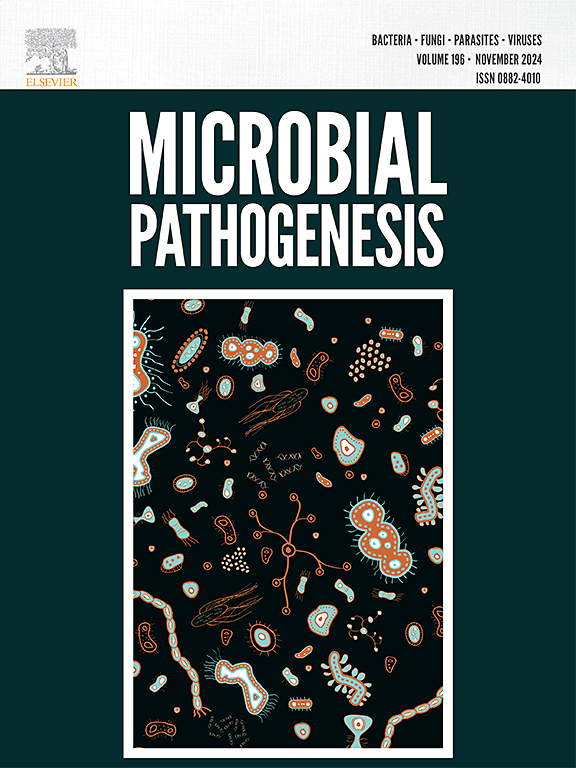Phage cocktail inhibits inflammation and protects the integrity of the intestinal barrier in dextran sulfate sodium-induced colitis mice model
IF 3.3
3区 医学
Q3 IMMUNOLOGY
引用次数: 0
Abstract
Ulcerative colitis (UC) is an inflammatory bowel disease characterized by abdominal pain, diarrhea, and rectal bleeding. This study aims to explore the protective effects of a phage cocktail (108 PFU/mL of Clostridium perfringens phage, 108 PFU/mL of Escherichia coli phage, and 108 PFU/mL of Salmonella phage) on a mouse colitis model induced by dextran sulfate sodium (DSS) and its potential toxic effects on normal mice. The results demonstrate that the phage cocktail significantly alleviates clinical symptoms in mice, reduces colon shortening, weight loss, and colonic pathological damage. Furthermore, the phage cocktail markedly suppresses the inflammatory response and safeguards intestinal barrier integrity in the colonic tissues of the mouse colitis model. Preliminary investigation of the toxic effects of the phage cocktail in mice indicates that continuous administration for 14 days does not yield statistically significant differences in hematological and blood biochemical parameters, and specific pathological changes are absent in histopathological examination results. The aforementioned findings suggest that the phage cocktail exhibits anti-inflammatory and intestinal barrier protective effects in the mouse colitis model, and it does not exert significant toxic side effects on mice.
噬菌体鸡尾酒抑制右旋糖酐硫酸钠诱导的结肠炎小鼠模型的炎症并保护肠道屏障的完整性。
溃疡性结肠炎(UC)是一种以腹痛、腹泻和直肠出血为特征的炎症性肠病。本研究旨在探讨鸡尾酒噬菌体(108 PFU/mL 产气荚膜梭菌噬菌体、108 PFU/mL 大肠杆菌噬菌体和 108 PFU/mL 沙门氏菌噬菌体)对右旋糖酐硫酸钠(DSS)诱导的小鼠结肠炎模型的保护作用及其对正常小鼠的潜在毒性作用。结果表明,鸡尾酒噬菌体能明显缓解小鼠的临床症状,减少结肠缩短、体重减轻和结肠病理损伤。此外,鸡尾酒噬菌体还能明显抑制小鼠结肠炎模型结肠组织的炎症反应,保护肠道屏障的完整性。对鸡尾酒噬菌体对小鼠毒性作用的初步研究表明,连续给药 14 天,小鼠的血液学和血液生化指标并没有显著的统计学差异,组织病理学检查结果也没有特定的病理变化。上述结果表明,鸡尾酒噬菌体在小鼠结肠炎模型中具有抗炎和保护肠道屏障的作用,对小鼠没有明显的毒副作用。
本文章由计算机程序翻译,如有差异,请以英文原文为准。
求助全文
约1分钟内获得全文
求助全文
来源期刊

Microbial pathogenesis
医学-免疫学
CiteScore
7.40
自引率
2.60%
发文量
472
审稿时长
56 days
期刊介绍:
Microbial Pathogenesis publishes original contributions and reviews about the molecular and cellular mechanisms of infectious diseases. It covers microbiology, host-pathogen interaction and immunology related to infectious agents, including bacteria, fungi, viruses and protozoa. It also accepts papers in the field of clinical microbiology, with the exception of case reports.
Research Areas Include:
-Pathogenesis
-Virulence factors
-Host susceptibility or resistance
-Immune mechanisms
-Identification, cloning and sequencing of relevant genes
-Genetic studies
-Viruses, prokaryotic organisms and protozoa
-Microbiota
-Systems biology related to infectious diseases
-Targets for vaccine design (pre-clinical studies)
 求助内容:
求助内容: 应助结果提醒方式:
应助结果提醒方式:


